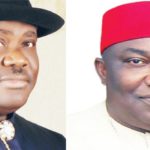(Adds Eni comment)
By Camillus Eboh
ABUJA Jan 26 (Reuters) – A Nigerian court has ordered the temporary forfeiture of assets and the transfer of operations of a long-disputed oilfield owned by Shell and Eni , among others, to the federal government, court papers showed.
The court orders will last until Nigeria’s anti-corruption agency concludes an investigation into how the current owners acquired oil prospecting licence (OPL) 245, according to the papers released on Thursday.
This is the latest of many inquiries, including by Dutch and Italian authorities, into the 2011 purchase of the OPL 245 block which could hold up to 9.23 billion barrels of oil, according to industry figures.
“We are aware of media reports but we have not received any notification,” a spokesman for Italian oil major Eni said in an email to Reuters.
The Shell Petroleum Development Company of Nigeria declined to comment.
The Economic and Financial Crimes Commission (EFCC), Nigeria’s anti-corruption agency, filed the papers to the court in the capital Abuja on Jan. 11.
The other parties were not present in court for the ruling and can challenge the decision.
The inquiry will investigate whether the $1.3 billion purchase of OPL 245 involved “acts of conspiracy, bribery, official corruption and money laundering,” the court papers said.
Nigeria’s EFCC “can’t put a timeline on when the investigations would be concluded,” the watchdog’s spokesman Wilson Uwujaren told Reuters by phone.
The oil field’s licence was initially awarded in 1998 by former Nigerian oil minister Dan Etete to Malabu Oil and Gas, a company in which he held shares.
It was then sold for $1.3 billion in 2011 to Eni and Shell. According to documents from a British court, Malabu received $1.09 billion from the sale, while the rest went to the Nigerian government.
Italian prosecutors in December wrapped up a probe into the head of Eni, its former CEO, the company itself and Shell over alleged corruption surrounding the licence’s acquisition, sources told Reuters at the time. (Reporting by Camillus Eboh; Additional reporting by Libby George in London; Writing by Paul Carsten; Editing by Alexander Smith/Elaine Hardcastle)











